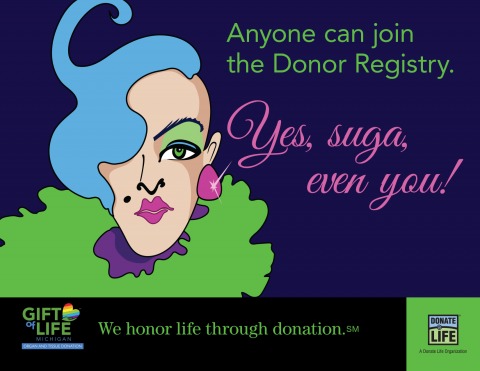La decisión de ser donante es un acto altruista y compasivo.
Alentamos a todos a registrarse, incluidos los miembros de la comunidad LGBTQ +.
La pregunta de elegibilidad surge con mayor frecuencia con respecto a los hombres homosexuales sexualmente activos u otras personas a quienes se les puede haber dicho que no pueden donar hemoderivados. Los criterios que se utilizan para determinar qué órganos se pueden donar se basan en la condición médica de la persona en el momento de la muerte y no son los mismos criterios que se utilizan para determinar quién puede donar sangre.

- Ojo y donación de tejidos (hueso, piel, válvulas cardíacas, etc.) están regulados por la Asociación de Alimentos y Medicamentos (FDA), al igual que la donación de sangre.
- los FDA actualmente tiene una política de aplazamiento de sexo de hombre a hombre que podría evitar que un hombre que ha sido sexualmente activo con un hombre en los últimos 12 meses done sus tejidos o córneas. Gift of Life Michigan está obligado a seguir la política de la FDA al facilitar la donación de tejidos.
- Sin embargo, la donación de órganos no está regulada por la FDA, está regulada por la Departamento de Salud y Servicios Humanos de EE. UU. (HHS); por lo tanto, a los hombres que han tenido relaciones sexuales con hombres no se les prohíbe la donación de órganos.
Del mismo modo, la orientación sexual, el género, la identidad de género o la expresión de una persona no tienen ninguna determinación sobre si recibir un trasplante de órgano. Cualquiera puede recibir un trasplante que lo necesite siempre que sea evaluado por un centro de trasplante y se determine que está en condiciones de pasar por el proceso de trasplante y cuidar bien de su órgano que salva vidas después del trasplante.
Ley ESPERANZA
Acerca de la Ley de Equidad en las Políticas de los Órganos del VIH (HOPE)
los Ley de Equidad en las Políticas de los Órganos del VIH (HOPE), que fue promulgada por el presidente Obama en 2013, permite el trasplante de órganos de VIH a VIH. A partir de 2020, casi 200 personas que viven con el VIH han recibido trasplantes de órganos de donantes que viven con el VIH gracias a la Ley HOPE.
- La Ley HOPE no solo permite a los donantes fallecidos que habían estado viviendo con el VIH dar el regalo de la vida, ahora es posible que las personas que viven con el VIH donen su riñón o una parte de su hígado. como donante vivo a las personas en la lista nacional de espera de trasplantes que también viven con el VIH y esperan un trasplante de órganos que les salve la vida.
- Gracias a los avances médicos en el trasplante, hoy más personas que nunca son elegibles para ser donantes de órganos. Los donantes de órganos que viven con el VIH o la hepatitis C o B pueden salvar la vida de alguien de la lista que también sea positivo para la misma afección tratable.



